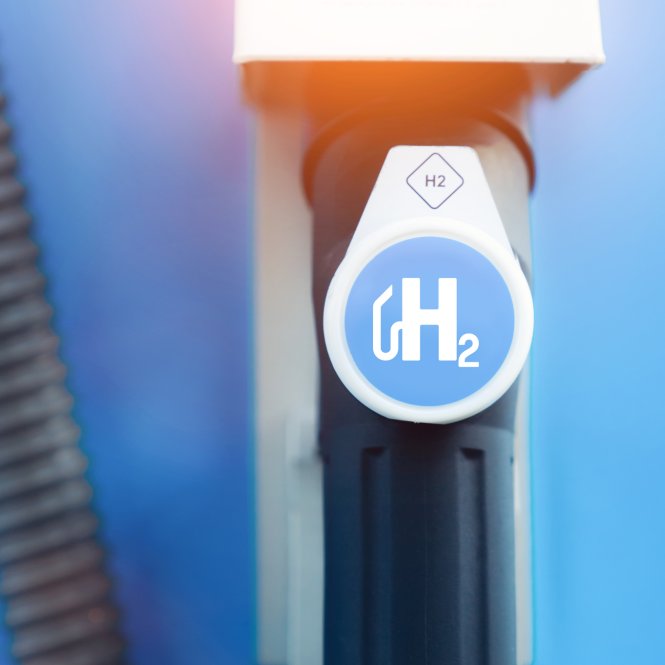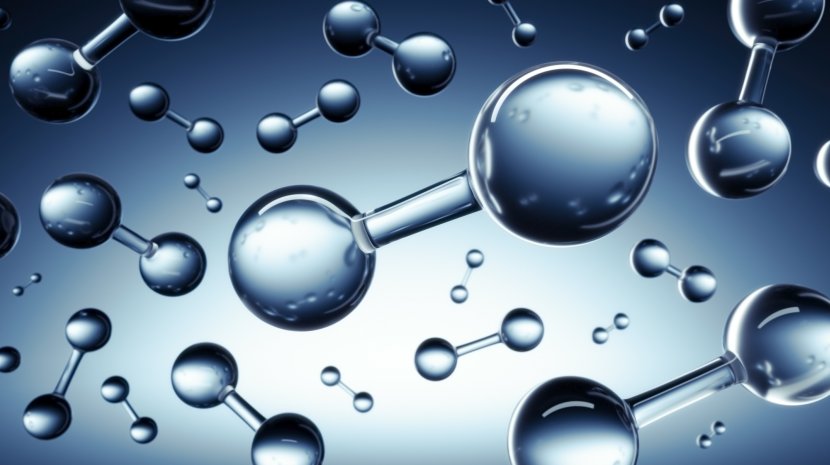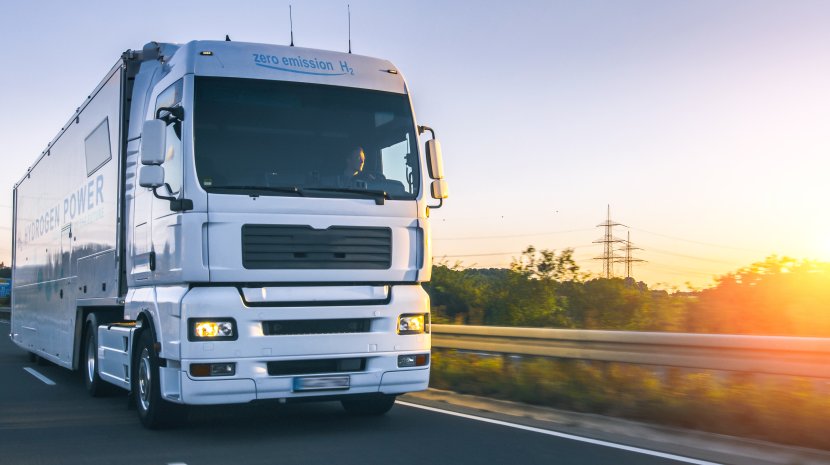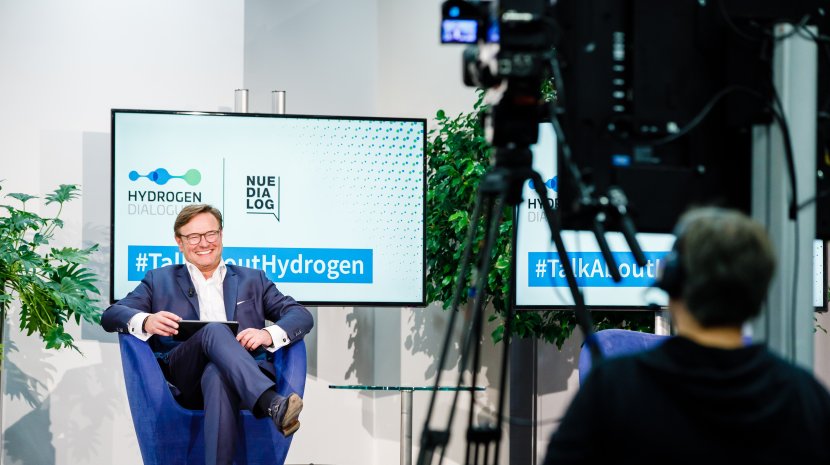

Hydrogen is an essential energy carrier of the future in a climate-neutral world. With the HYDROGEN DIALOGUE as a platform for industry, science and politics, NürnbergMesse is networking the experts. We have compiled a compact summary of what you need to know about hydrogen here.
Hydrogen is a chemical element that occurs in nature, for example in combination with oxygen atoms as water (H2O), but also in biomass or hydrocarbons such as crude oil or natural gas. The chemical element is abbreviated with H2. Hydrogen is the lightest and also the most abundant element in the universe. It has a very high energy density: one kilogram of hydrogen is about as energy-rich as three kilograms of petrol or diesel.

3D models of the molecule H2 hydrogen
Green hydrogen is produced by electrolysis of water, the electricity for this comes exclusively from renewable energies and is thereforeCO2-free.
Grey hydrogen has a fossil fuel as its feedstock. In most cases, natural gas is converted into carbon dioxide (CO2) and hydrogen using heat ("steam reforming"). The CO2 is released unused into the atmosphere, thus reinforcing the greenhouse effect. Ten tons of CO2 are produced for every ton of hydrogen produced.
Blue hydrogen is produced by storing (Carbon Capture and Storage / CCS) the CO2 produced in steam reforming. In balance sheet terms, this type of production is considered CO2-neutral, as nothing is released into the atmosphere.
Turquoise hydrogen is obtained via the thermal splitting of methane ("methane pyrolysis"). This produces solid carbon. Only if this is permanently bound and the heat supply of the high-temperature reactor comes from renewable energies is the production considered CO2-neutral.

Truck with hydrogen engine
Generation: For a sustainable hydrogen economy (CO2-neutral), the production of "green" hydrogen on an industrial scale must be advanced in the future. This is done by means of electrolysis from water and electricity from renewable energies. In thermochemical or biological conversion processes from biomass, the carbonaceous by-products are stored.
Logistics: The aim is to transport the hydrogen produced from A to B as cheaply and without loss as possible, even over long distances. Logistics technologies should therefore use existing infrastructures such as gas pipelines or existing tank farms, tanker vehicles and filling stations. The cooperation of partners (providers of technological expertise, plant manufacturers, municipalities, etc.), the establishment of standards and international cooperation are crucial for resilient business models for hydrogen users.
Use: Hydrogen offers attractive opportunities for use in the mobility, industrial, heating and electricity sectors. In Germany, large CO2 savings potentials can be realized, especially through applications in the mobility and industrial sectors. In the long term, there is also great potential in the building (heat) and energy (seasonal storage) sectors.
Scaling: A future hydrogen economy must be economically viable. A breakthrough can be achieved through more efficient mass production and advances in specific production technologies. Therefore, the establishment and expansion of research and development infrastructures is strategically of high importance. However, it is also crucial to have confidence in product sales. Central to this are: identifying applications in which the use of hydrogen is already close to economic viability, and stimulating demand via large-scale use of products, e.g. in the public sector.

Use of hydrogen for renewable energy production
European Clean Hydrogen Alliance: The European Clean Hydrogen Alliance, launched in July 2020, aims to build a series of viable investment projects along the hydrogen value chain. This aims to create a clean hydrogen market that contributes to growth, creates jobs and reduces greenhouse gas emissions. The European Alliance for Clean Hydrogen brings together industry, national and local authorities, civil society and other stakeholders. It is strongly anchored in the hydrogen value chain, covering renewable and low-carbon hydrogen from production to transport and applications in mobility, industry, energy and heating.
National Hydrogen Council: The National Hydrogen Council (NWR) was appointed by the German Federal Government and acts as an independent, non-partisan advisory body. The Council consists of 26 high-ranking experts from industry, science and civil society and is supported by the National Hydrogen Strategy (NWS). With the NWS, adopted in June 2020, the German government is creating a framework for action for the future production, transport, use and further use of hydrogen and thus for corresponding innovations and investments. The strategy defines steps and contributions to achieve the climate targets, to create new value chains for the German economy and to further develop international energy policy cooperation.
Hydrogen Alliance Bavaria: The networking, knowledge and interest platform for now more than 170 hydrogen stakeholders from industry, science and politics in Bavaria was founded in September 2019. The alliance partners contribute to strengthening and expanding Bavaria's technological competence in the field of innovative hydrogen technologies.
Center Hydrogen.Bavaria (H2.B): The Center Hydrogen.Bavaria is the central strategy and coordination office of the Free State of Bavaria for hydrogen-related topics with the focus on strategy & roadmap development, demonstration & analysis as well as public relations & networking. The H2.B coordinates the activities in the Hydrogen Alliance Bavaria.

Hydrogen Dialogue: The Hydrogen Dialogue of NürnbergMesse took place for the first time in autumn 2020 as a new platform for the hydrogen community. Experts from business, science and politics are in dialogue with top-class international speakers. The presentations and discussions move along the entire value chain with a view to national strategies and the international hydrogen economy. The event also uses digital tools to promote networking and interaction among participants. The conceptual partner is the Center Hydrogen.Bavaria.
Image credits:
iStock / audioundwerbung




